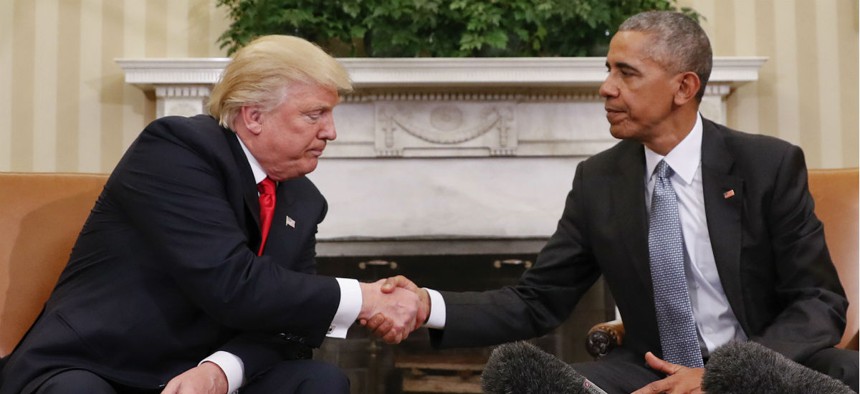Trump Transition Declined Some Ethics Advice, Rejected Some GAO Interviews
Watchdog report to Democratic lawmakers finds no misspent funds.
The Trump pre-inaugural transition team had its financial books in order, but got a late start in tapping government expertise on ethics arrangements, according to a Government Accountability Office review requested by Democratic lawmakers and released on Tuesday.
Auditors for the congressional watchdog, examining how the Trump team operated within the laws on presidential transitions in comparison with President Obama’s administration, were denied interviews with some on the new White House team.
“Because several leaders of the Trump-Pence Transition Team moved to the Executive Office of the President following the inauguration, we contacted the White House Counsel to solicit the perspective of the Trump-Pence Transition Team on information and services made available and provided to them during the transition and obtain additional information on the transition,” said the report addressed to Sens. Tom Carper, D-Del., and Elizabeth Warren, D-Mass., and Rep. Elijah Cummings, D-Md.
“They did not respond to requests for an interview,” said the report, dated Sept. 7. “We contacted the Office of the Vice President because Vice President Pence also served as the Chairman of the Trump-Pence Transition Team. The Office of the Vice President did not respond to our request to discuss this work. We also contacted the Executive Director and Chief Financial Officer of the Trump-Pence Transition Team. The Transition Team declined our request for an interview and stated that several areas of our report” could be addressed by meeting with officials at the General Services Administration and the Office of Government Ethics. “They declined to discuss the last area related to communications with foreign leaders due to pending investigations.”
GAO auditors examined the Trump transition team’s $3.13 million of federal expenditures for the period ending on Jan. 31, 2017, and found them to be properly classified. Most went for payroll for the 110 transition team employees.
In addition, the Trump team, as is normal practice, raised private funds, totaling $6.5 million from 3,000 contributors who gave in amounts ranging from $1 to $5,000, as the transition reported in February.
As is also the case in presidential transitions, Office of Government Ethics employees were brought in to advise the transition. One of OGE’s recommendations was that the team “detail or hire a government ethics expert prior to inauguration to manage the nominee process, including coordinating with OGE to address comments on nominees’ reports.” OGE recommended a list of senior ethics officials from executive branch agencies who are qualified. But the only response from President Trump came after the inauguration, when he named private-sector attorney Stefan Passantino as White House ethics officer.
OGE, auditors found, also offered preliminary and “blind” reviews of potential conflicts of interest for nominees being considered in cases where the prospective nominee’s financial disclosure reports were not ready. But according to OGE officials, “the transition team did not give OGE financial information to conduct blind reviews of prospective nominees.”
This contrasted with the transition to Obama in 2008-2009, the report noted. Back then, the incoming transition team began submitting draft nominee financial disclosure forms in November after the election, eventually delivering 90 of them by Inauguration Day, and 564 by July 31. The Obama-Biden transition team also hired a government ethics expert after the inauguration. In May, Trump changed the procedures and began vetting nominees through OGE before announcing them.
Another area examined by GAO were the sometimes-controversial phone calls to world leaders made during the transition by President-elect Trump and Vice President-elect Mike Pence. Interviews with State Department officials showed that State did coordinate the calls, which did not require a secure telephone line because the callers at that time were still private citizens. In total, Trump and Pence made about 60 calls—mostly congratulatory—between Election Day and the inauguration (most of them before Nov. 18, when Trump “landing teams” arrived at State). State employees did not monitor the calls, but did connect 16 of them.
A GAO spokesman declined to comment when asked to characterize the report’s details about the interviews GAO auditors were denied. A staffer for Rep. Cummings said they “have never heard of an instance like this in which the White House has refused to answer any questions from government auditors about the use of taxpayer funds.”
Sen. Tom Carper, D-Del., said:
“This report highlights some glaring inefficiencies in our country’s presidential transition process, especially when it comes to ethics. It’s clear now that every incoming administration should partake in ethics training to ensure it operates smoothly from the start, recognizes and prevents conflicts of interest, and protects the interests of the American people above all else.”
Martha Joynt Kumar, a Towson University political scientist emeritus who studies transitions, told Government Executive that the report demonstrates how “Congress has been more interested in passing transition legislation than it has been concerned with how their legislation has worked in relation to their transition goals.” Success has depended on “a willingness of the incoming team to follow the practices of earlier administrations in some areas that are not required by law, such as providing OGE with nominee financial information before nominee portfolios goes up to the Senate.”
She suggested that the Trump transition might have gone more smoothly had Trump stuck with his initial management team of manager Rich Bagger and New Jersey Republican Gov. Chris Christie. “They were the ones who worked with government agencies during the pre-transition period and worked with government officials providing information they found useful,” she said. “The report points up the difficult of enforcing the transition laws as the new team members are not government employees.”




